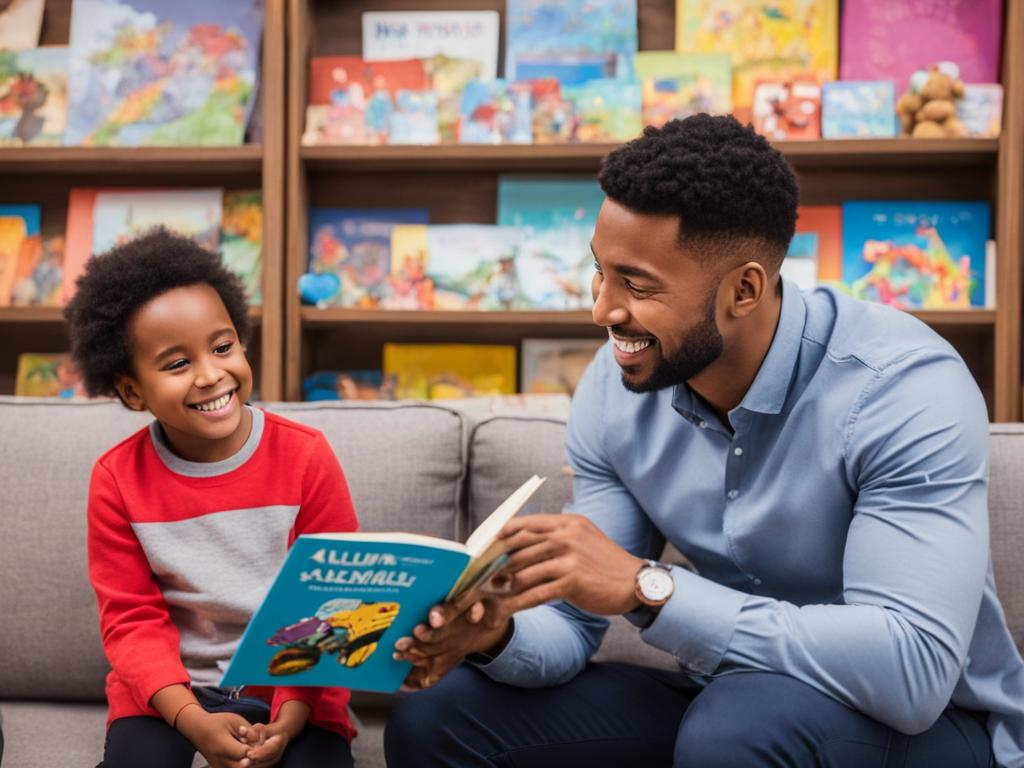Guardian Ad Litem Home Visit Prep Guide
A guardian ad litem (GAL) is appointed by the court to investigate child custody and placement arrangements in cases where the parties cannot agree. The GAL’s recommendation holds significant weight in court, so it’s crucial to be prepared for their home visit. This comprehensive checklist will help you ensure that your environment meets all recommendations for a successful visit.
Key Takeaways:
- Applying the guardian ad litem home visit checklist is crucial for a successful court process.
- The GAL’s recommendation holds significant weight in court.
- Preparing your home for the visit and providing necessary information is essential.
- Child preparation for the home visit plays a significant role in the investigation process.
- Working with an experienced family law attorney can provide valuable guidance and support throughout the process.
Understanding the Guardian Ad Litem Investigation
A guardian ad litem (GAL) is appointed by the court to conduct an investigation and make recommendations regarding child custody and placement determination. Their role is crucial in ensuring the best interests of the child are met. During the investigation, the GAL gathers information from both parents, reviews relevant documents and records, and may even interview third parties such as teachers and healthcare providers.
The goal of the GAL is to gather comprehensive and unbiased information to determine the most beneficial custody and placement arrangements for the child. Their recommendations carry significant weight in court proceedings, influencing the final outcome of the case.
The GAL’s investigation involves assessing various factors that impact the child’s well-being, including the child’s relationship with each parent, the stability of each parent’s home environment, the ability of the parents to cooperate, and any mental health issues that may be relevant.
To ensure an impartial evaluation, the GAL remains neutral throughout the investigation process, focusing solely on the child’s best interests. This objectivity is crucial in providing the court with a well-informed and unbiased recommendation.
“The guardian ad litem investigates, evaluates, and, in essence, becomes the voice of the child in court proceedings.” – Legal Expert
In-Depth Evaluation Process
During the investigation, the GAL meticulously assesses various aspects related to the child’s welfare:
- Evaluating the child’s relationship with each parent, considering the quality and nature of their interactions.
- Reviewing the stability and suitability of each parent’s home environment, emphasizing the child’s safety and well-being.
- Gathering information regarding any history of substance abuse, criminal activities, or other concerns that may affect the child’s welfare.
- Assessing the child’s educational progress, extracurricular activities, and involvement in the community.
- Evaluating the child’s medical and mental health needs, consulting with healthcare providers and therapists when necessary.
The GAL strives to obtain a comprehensive understanding of the child’s circumstances by considering all relevant factors. This ensures that their recommendation encompasses a holistic view of the child’s best interests.
By appointing a guardian ad litem, the court aims to make informed decisions that promote the child’s welfare and create a stable and nurturing environment.
Factors Considered in Guardian Ad Litem Investigation
| Factors | Description |
|---|---|
| Parent-Child Relationship | Evaluating the quality of interactions and emotional connection between each parent and the child. |
| Home Environment | Assessing the stability and suitability of each parent’s residence for the child’s well-being. |
| Cooperation Between Parents | Evaluating the parents’ ability to work together effectively and communicate for the child’s benefit. |
| Mental Health Issues | Considering any mental health concerns that may impact the child’s safety and emotional well-being. |
| History of Crime or Substance Abuse | Reviewing any criminal activities or substance abuse issues that may affect the child’s welfare. |
Preparation Tips for Parents
Before the initial meeting with the GAL (Guardian Ad Litem), it’s crucial to be well-prepared. This meeting plays a pivotal role in the child custody investigation, and it’s essential to provide the GAL with relevant information that will help them understand your unique situation. Here are some preparation tips to keep in mind:
Gather Key Information
Compile important information related to your family history, your relationship with the other parent, and your child’s relationship with each parent. This includes details such as previous court orders, any ongoing disputes or concerns, and any relevant documentation. Having this information readily available will help facilitate a productive discussion with the GAL.
Discuss the Nature of the Dispute
During the meeting, be prepared to discuss the nature of the dispute and the issues at hand. Clearly communicate your concerns, desired custody arrangements, and any challenges you are facing. This will allow the GAL to gain a deeper understanding of your perspective and the dynamics involved.
Provide Information about Third Parties
It’s important to inform the GAL about any third parties who may have relevant information about your case. This could include teachers, therapists, coaches, or other individuals involved in your child’s life. The GAL may want to interview these individuals to gather additional insights and perspectives.
Cooperate with the GAL’s Requests
The GAL may request specific documents or information from you during the meeting. It is crucial to cooperate fully and provide all requested materials in a timely manner. This may include financial documents, medical records, or any other evidence that may be relevant to the investigation.

| Preparation Tips for Parents |
|---|
| Gather key information |
| Discuss the nature of the dispute |
| Provide information about third parties |
| Cooperate with the GAL’s requests |
Preparing for the Home Visit
The home visit is a crucial part of the guardian ad litem’s investigation process. It provides them with a firsthand look into the child’s living environment and helps them ascertain whether it is suitable and conducive to their well-being. To ensure a successful home visit, here are some tips and recommendations:
- Clean and Orderly Environment: Make sure your home is clean, organized, and child-friendly. Remove any clutter or hazards that may pose a risk to the child’s safety. This includes securing loose cables, storing cleaning supplies out of reach, and ensuring that all rooms are adequately ventilated.
- Scheduled or Surprise Visit: Be prepared for the home visit to either be scheduled in advance or conducted as a surprise drop-by. Regardless of the timing, ensure that your home is always prepared for a visit from the guardian ad litem.
- Pets: If you have pets, especially aggressive or overly friendly ones, consider keeping them in a separate area during the home visit. This ensures the guardian ad litem’s safety and prevents any distractions that may interfere with the assessment.
- Photos and Videos: During the home visit, the guardian ad litem may take photos or videos of the living environment as evidence for their investigation. Be cooperative and allow them to document the space accordingly.
- Meeting Other Adults or Individuals: The guardian ad litem may request to meet other adults or individuals residing in the home. Ensure that they are aware of the visit and available to provide any necessary information or answer questions that may arise.
Quotes:
The home visit presents a valuable opportunity for the guardian ad litem to assess the child’s living conditions and determine their suitability. By following these preparation tips, you can ensure a favorable impression during this important stage of the investigation.”
Through proper home visit preparation, you can contribute to a comprehensive and accurate assessment by the guardian ad litem. This enhances the overall investigation process and helps ensure the best outcome for the child involved.
| Preparation Tips for Home Visit | |
|---|---|
| Ensure a clean and organized environment | ✔️ |
| Be prepared for scheduled or surprise visits | ✔️ |
| Secure aggressive or overly friendly pets | ✔️ |
| Cooperate with the guardian ad litem’s photo and video documentation requests | ✔️ |
| Make other adults or individuals in the home available for meeting | ✔️ |
Tips for Child Preparation
If your child is at least four years old, the GAL may choose to interview them during the home visit. It’s important to help your child prepare for this interview to ensure they feel comfortable expressing themselves and providing valuable insights. Here are some tips to assist you in preparing your child:
- Discuss their interests: Encourage your child to talk about their hobbies, favorite activities, and things they enjoy doing. This will help the GAL better understand their personality and preferences.
- Talk about friends and family members: Prompt your child to share information about their relationships with friends and family members. This can include their best friends, grandparents, or siblings. Knowing who is important in their life can give the GAL a broader understanding of their support network.
- Emphasize the GAL’s role: Explain to your child that the GAL is there to learn about their needs and desires. Assure them that their input is valuable and will be taken into account when decisions are made.
- Encourage honesty: Let your child know that it’s important to be honest during the interview. They should feel comfortable sharing their thoughts, feelings, and concerns with the GAL. Avoid coaching them on what to say or trying to influence their responses.
- Create a comfortable environment: The GAL may use puzzles or art supplies to help your child feel more at ease during the interview. Ensure that these items are accessible and that your child has a quiet and comfortable space where they can speak openly with the GAL.

By preparing your child for the GAL interview, you can help them feel more confident and ensure that their voice is heard. It’s essential to encourage honesty, emphasize the GAL’s role, and provide a comfortable environment for the interview.
Role of the Guardian Ad Litem in the Court Process
The Guardian Ad Litem (GAL) plays a crucial role in the court process, providing valuable recommendations to the judge based on their thorough investigation. The GAL’s primary responsibility is to advocate for the best interests of the child and ensure that any custody arrangements align with what is beneficial for the child’s well-being.
During court hearings, the GAL may be present to represent the child’s interests and provide insights into the case. Their presence allows them to offer valuable information and perspectives to the judge, helping them make informed decisions regarding custody and placement. Additionally, the GAL has the responsibility to respond to motions or petitions related to the case, ensuring that all relevant factors are considered.
The GAL’s involvement doesn’t end with the conclusion of the hearings. They continue to offer ongoing support, ensuring that the court’s ruling is implemented and complied with. This ongoing involvement helps to safeguard the child’s best interests and provides a level of accountability for all parties involved.
Importance of Custody Recommendation
The GAL’s custody recommendation holds significant weight in court and is a key determinant in the final decision-making process.
The GAL’s custody recommendation is the culmination of their thorough investigation and assessment of the child’s circumstances, relationships, and environment. Their comprehensive understanding of the case enables them to provide an informed and unbiased recommendation, which is intended to serve the child’s best interests.
The judge carefully considers the GAL’s recommendation, as it is based on their objective evaluation and expertise in child custody matters. The GAL’s role as an impartial advocate helps ensure that the court’s decision is centered on what is beneficial for the child, promoting their safety, well-being, and overall development.
Ongoing Support
The GAL’s ongoing involvement provides ongoing support and ensures compliance with the court’s ruling.
Even after the court’s decision has been made, the GAL’s role doesn’t end. They continue to monitor the implementation of the custody arrangements and ensure that both parents comply with the court’s ruling. This ongoing support and oversight help to safeguard the child’s best interests and ensure a smooth transition into the new custody arrangement.
If any issues or concerns arise post-judgment, the GAL may be called upon to provide further support or clarification. This ongoing involvement helps to address any potential conflicts or disputes that may arise, ultimately promoting the child’s well-being and overall adjustment.
By having a GAL actively involved in the court process, the child’s best interests are prioritized, and their voice is heard throughout the proceedings. The GAL’s recommendation and ongoing support help to ensure that any custody arrangements are in the child’s best interests and promote a healthy and nurturing environment for their growth and development.
Factors Considered by the Guardian Ad Litem
During their investigation, the Guardian Ad Litem (GAL) takes into account several critical factors that can influence child custody and placement decisions. These factors provide valuable insights into the child’s well-being and the suitability of each parent to fulfill their responsibilities. By considering these aspects, the GAL aims to ensure the child’s safety, happiness, and healthy parent-child relationship.
1. Home Environment
The stability and suitability of each parent’s home are key factors that the GAL assesses. They examine the living conditions, cleanliness, and overall environment to determine how conducive it is for the child’s well-being. A safe and nurturing home is essential for the child’s growth and development.
2. Cooperation Between Parents
The GAL evaluates the level of cooperation between parents, as effective co-parenting is crucial for the child’s best interests. They assess the ability of both parents to communicate, make joint decisions, and work together to ensure the child’s needs are met. Cooperation between parents fosters a healthy and stable environment for the child.
3. Mental Health Issues
The GAL takes into account any mental health issues that may impact a parent’s ability to care for the child. They consider factors such as depression, anxiety, substance abuse, or any other conditions that could affect parenting capabilities. The well-being of the child depends on the mental health stability of both parents.
4. History of Crime or Substance Abuse
A parent’s history of crime or substance abuse is a significant factor in the GAL’s investigation. They assess whether a parent has a criminal record, history of domestic violence, or substance abuse issues. The safety and well-being of the child are of utmost importance, and past behaviors or actions may be indicative of future risks.
5. Parent-Child Relationship
The quality of the parent-child relationship is carefully assessed by the GAL. They observe and consider the emotional bond, level of involvement, and positive interaction between the child and each parent. A healthy and nurturing parent-child relationship is essential for the child’s overall well-being.
6. School Performance and Special Needs
The GAL evaluates the child’s school performance and any special needs or considerations they may have. They assess whether each parent is able to support the child’s educational needs and provide any necessary accommodations or resources. The GAL considers the child’s academic progress and any additional support required for their success.
By examining these and other relevant factors, the GAL aims to make informed recommendations that are in the child’s best interests. The GAL’s investigation is a crucial step in ensuring a fair and balanced custody and placement determination.

Image: Representation of the factors considered by the Guardian Ad Litem during their investigation.
Cost of Guardian Ad Litem Services
When it comes to the cost of hiring a guardian ad litem (GAL), several factors come into play. The cost can vary depending on the location and the type of services provided. Generally, it is the responsibility of the parents to cover the expenses of the GAL, unless they can demonstrate financial hardship.
The fees associated with GAL services can range from a few hundred dollars to several thousand. The complexity of the case and the GAL’s hourly rate are two significant factors that influence the overall cost. More complex cases that require extensive investigations and court appearances will likely incur higher fees.
In some instances, GALs may volunteer their services in order to assist families who cannot afford the costs. These volunteers do not receive any compensation for their work, further highlighting the importance of financial responsibility in such cases.
| GAL Services | Cost Range |
|---|---|
| Basic GAL Services (Investigation and Reporting) | $500 – $2,000 |
| Complex GAL Services (Extensive Investigations, Court Appearances) | $2,000 – $5,000+ |
| Volunteer GAL Services | No cost |
It’s important to note that these cost ranges are just estimates and can vary depending on individual circumstances. Consulting with your family law attorney can provide you with a more accurate estimate based on your specific case.

Ensuring financial responsibility in covering the cost of GAL services is crucial for all parties involved. It allows for a fair and unbiased assessment of the child’s best interests during custody and placement determination.
When is a Guardian Ad Litem Required?
In the realm of child custody battles, dependency and neglect cases are particularly complex. To ensure that the best interests of the child are protected, certain jurisdictions require the involvement of a Guardian Ad Litem (GAL). While the requirement of a GAL varies from state to state, in Colorado, they are mandated for all dependency and neglect cases.
If you find yourself involved in a child custody battle in Colorado Springs, it is crucial to understand the specific requirements in your jurisdiction. Seeking guidance from an experienced family law attorney can provide you with the necessary legal counsel and support throughout the process.

| State | Requirement |
|---|---|
| California | Required in some dependency and neglect cases |
| Florida | Required in all dependency and neglect cases |
| Texas | Not required in dependency and neglect cases |
Dependency and Neglect Cases
In the context of child custody battles, dependency and neglect cases involve situations where a child’s safety, well-being, or development is at risk due to parental actions or circumstances. These cases often require the court’s intervention to protect the child’s best interests.
“In Colorado Springs, a Guardian Ad Litem (GAL) must be assigned to all dependency and neglect cases, ensuring that the child’s well-being and needs are closely examined and prioritized.”
The GAL plays a crucial role in these cases, conducting thorough investigations, considering the specific circumstances, and making recommendations to the court. Their involvement is essential in ensuring that every child’s rights are safeguarded, and appropriate custody and placement arrangements are determined.
It’s worth noting that while GALs are commonly required in dependency and neglect cases, their involvement may extend to other child custody matters as deemed necessary by the court.
If you require further information or guidance about the role of a GAL in dependency and neglect cases, reaching out to a knowledgeable family law attorney can provide you with the insights and support you need to navigate this challenging legal process.
Role of the Guardian Ad Litem in Court Hearings
In court hearings, the Guardian Ad Litem (GAL) plays a crucial role in ensuring that the child’s interests are properly represented. Their ongoing involvement throughout the case is dedicated to advocating for the child’s best interests and safeguarding their well-being.
The GAL actively participates in all court hearings related to the case, providing valuable recommendations and responses to motions or petitions that may impact the child’s welfare. Their comprehensive understanding of the case and their involvement in the investigation allow them to offer insights that have a significant influence on the ultimate outcome.
“The GAL serves as the voice and protector of the child in court, ensuring that their needs and interests are given priority in the decision-making process.”
From the initial stages of the case to the concluding hearing, the GAL remains engaged and committed to the child’s best interests. If necessary, they may continue their involvement beyond the concluding hearing, ensuring compliance with the court’s ruling or addressing any ongoing concerns that may arise.
The GAL’s primary goal is to ensure that the court’s decisions are aligned with the child’s well-being and that any post-hearing arrangements prioritize the child’s interests. By advocating for the child’s best interests in court, the GAL serves as a vital guardian and facilitator of a fair and just resolution.
Ongoing Involvement
Throughout the court proceedings, the GAL’s ongoing involvement serves as a steadfast support for the child. By actively participating in hearings, the GAL can address any emerging issues and provide updates on the child’s welfare, ensuring that their interests remain at the forefront of the court’s considerations.
The GAL’s ongoing involvement signifies their commitment to the child’s well-being and serves as a reminder of the child’s importance within the legal process. It also offers a valuable opportunity to clarify any concerns or questions the court may have in relation to the child’s needs and the proposed arrangements.
Moreover, the GAL’s ongoing involvement extends beyond the court hearings. They may continue to be a point of contact and support for the child, providing guidance in enforcing and complying with the court’s rulings.
“The GAL’s ongoing involvement ensures that the child’s interests are not only considered during the court proceedings but also safeguarded beyond the conclusion of the case.”
While the court hearings are a crucial aspect of the legal process, the GAL’s ongoing involvement underscores their commitment to the child’s well-being throughout the entirety of the case.
| Benefits of GAL’s Ongoing Involvement |
|---|
| 1. Continuity of Care: The GAL’s presence offers consistent support and advocacy for the child, ensuring their needs are met even after the conclusion of the court hearings. |
| 2. Compliance with Court’s Ruling: The GAL monitors and ensures compliance with the court’s ruling, providing a safeguard against any potential violations or deviations. |
| 3. Ongoing Assessment: The GAL can assess the child’s well-being in the post-hearing period, addressing any emerging concerns and providing necessary interventions. |
In summary, the GAL’s role in court hearings is instrumental in safeguarding the child’s interests and advocating for their well-being. Their ongoing involvement ensures that the child’s needs are prioritized throughout the legal process and beyond, safeguarding their best interests in every aspect of their life.

Conclusion
A guardian ad litem (GAL) plays a crucial role in child custody cases, conducting thorough investigations and making recommendations in the best interests of the child. As a parent, it is essential to be prepared for the GAL’s home visit and fully cooperate during the investigation process. The GAL’s recommendations carry significant weight in court, making it vital to ensure that your environment meets all their recommendations.
Working with an experienced family law attorney can provide invaluable guidance and support throughout this challenging process. An attorney can help you understand the GAL’s role, assist in gathering the necessary information, and navigate the court proceedings effectively.
Remember, a successful outcome in a child custody case often depends on presenting a safe and suitable environment for your child. By collaborating with a GAL and your attorney, you can work towards a resolution that prioritizes your child’s best interests.
FAQ
What is a guardian ad litem (GAL)?
A guardian ad litem is appointed by the court to investigate child custody and placement arrangements in cases where the parties cannot agree. The GAL’s recommendation holds significant weight in court.
What is the role of the guardian ad litem?
The GAL conducts an investigation and makes recommendations regarding the child’s best interests in custody and placement matters. They gather information, review relevant documents, and may interview third parties such as teachers and healthcare providers.
What should I do to prepare for the initial meeting with the GAL?
Gather relevant information about your family history, relationship with the other parent, and your child’s relationship with each parent. Be prepared to discuss the nature of the dispute, desired custody arrangements, and any relevant third parties or information that could influence the investigation.
How should I prepare for the home visit by the GAL?
Ensure your home is clean, orderly, and suitable for children. Put away any aggressive or overly friendly pets. Be prepared for the GAL to take photos or videos during the visit. They may also want to meet other adults or individuals living in the home.
How can I help my child prepare for the GAL’s interview during the home visit?
Discuss your child’s interests, friends, and family members. Emphasize that the GAL is there to learn about their needs and desires. Avoid coaching your child on what to say and encourage honesty.
What is the role of the GAL in the court process?
The GAL provides recommendations to the judge based on their investigation and advocates for the child’s best interests. They participate in all court hearings related to the case and ensure compliance with the court’s ruling.
What factors does the GAL consider during their investigation?
The GAL considers factors such as the stability of each parent’s home, their ability to cooperate, mental health issues, any history of crime or substance abuse, the child’s relationship with each parent, school performance, and any special needs or considerations.
How much does a guardian ad litem cost?
The cost of a guardian ad litem varies depending on the location and type of services provided. Parents are generally responsible for paying the GAL, and fees can range from a few hundred dollars to several thousand.
When is a guardian ad litem required?
In some states, a guardian ad litem is required in dependency and neglect cases. However, in Colorado, a GAL must be assigned to all dependency and neglect cases. It’s important to understand the specific requirements in your jurisdiction.
What is the role of the GAL in court hearings?
The GAL participates in all court hearings related to the case and ensures that the child’s interests are represented. They provide recommendations and responses to motions or petitions that may affect the child’s well-being.
Can a guardian ad litem remain involved beyond the conclusion of the case?
Yes, a guardian ad litem may remain involved beyond the concluding hearing if necessary. They continue to ensure compliance with the court’s ruling and advocate for the child’s best interests.

